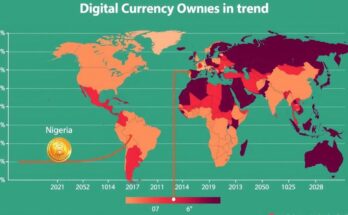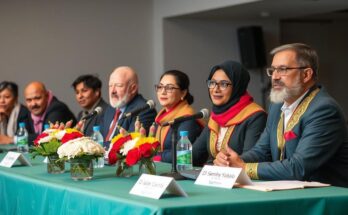Approximately 25 million Nigerians are receiving cash payments through a poverty alleviation initiative supported by biometric identification via the National Identification Number (NIN) and Bank Verification Number (BVN). Each eligible household receives 75,000 Naira, with the program targeting overall aid to 67 million citizens while addressing the increase in poverty levels due to economic challenges.
In Nigeria, approximately 25 million citizens from the national social register have begun receiving cash payments as part of a federal poverty alleviation initiative. The verification process utilizes biometric data linked to the National Identification Number (NIN) and the Bank Verification Number (BVN). Initiated in October of the previous year, this program specifically targets households living in poverty, with around five million households currently benefitting. Finance Minister Wale Edun announced that the first two payment tranches, amounting to 75,000 Naira (approximately US$45) per household, have already been dispensed, with plans for a third payment to follow. The overarching aim of this initiative is to reach an estimated 67 million Nigerians. Unfortunately, the timing coincides with a significant rise in poverty, as the World Bank’s 2024 report indicates that an additional 14 million Nigerians have been pushed into extreme poverty this year alone. The report highlights that nearly 47 percent of the Nigerian populace now lives below the global poverty threshold of less than $2.15 per day, calling for immediate governmental action to implement measures addressing inflation and enhancing fiscal stability. Edun assured continued efforts to develop a reliable social register that will effectively fulfill the government’s commitments to social protection. In addition to the cash distribution, the Finance Minister reported on other social intervention schemes, including assistance for 11,000 individuals through a consumer credit facility, support for 500,000 students via a loan program, and provisions for 600,000 farmers receiving subsidized agricultural inputs. Oyo State Governor Seyi Makinde confirmed that efforts are underway to establish an apolitical social register in his region to better assist vulnerable populations.
The cash payments represent a strategic response by the Nigerian government to combat rising poverty levels exacerbated by economic challenges. With nearly half of the population now classified as living in poverty, including many who have recently experienced financial downturns, the implementation of biometric identification aims to enhance the efficiency and accuracy of benefit distribution. The biometric program draws upon established national identifiers, ensuring that aid reaches the most deserving recipients while attempting to stabilize and uplift the economy.
The Nigerian government’s digital cash payment initiative, aimed at alleviating poverty for 25 million citizens, underscores a commitment to social welfare amid escalating economic distress. While this program offers immediate financial assistance to families in need, the broader challenge of poverty persists, necessitating bold policy measures. Continuous development of social registers and inclusive interventions in education and agriculture reflects an effort to create a sustainable support structure for vulnerable groups across Nigeria.
Original Source: www.biometricupdate.com




